Gimp or GIMP may refer to:
Pulp magazines were inexpensive fiction magazines that were published from 1896 until around 1955. The term "pulp" derives from the wood pulp paper on which the magazines were printed, due to their cheap nature. In contrast, magazines printed on higher-quality paper were called "glossies" or "slicks". The typical pulp magazine had 128 pages; it was 7 inches (18 cm) wide by 10 inches (25 cm) high, and 0.5 inches (1.3 cm) thick, with ragged, untrimmed edges. Pulps were the successors to the penny dreadfuls, dime novels, and short-fiction magazines of the 19th century.
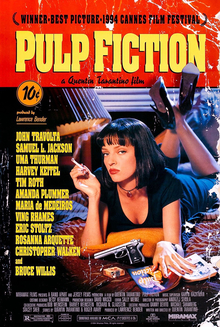
Pulp Fiction is a 1994 American independent crime film written and directed by Quentin Tarantino from a story he conceived with Roger Avary. It tells four intertwining tales of crime and violence in Los Angeles, California. The film stars John Travolta, Samuel L. Jackson, Bruce Willis, Tim Roth, Ving Rhames, and Uma Thurman. The title refers to the pulp magazines and hardboiled crime novels popular during the mid-20th century, known for their graphic violence and punchy dialogue.

Isabelle Yasmine Adjani is a French actress and singer of Algerian and German descent.
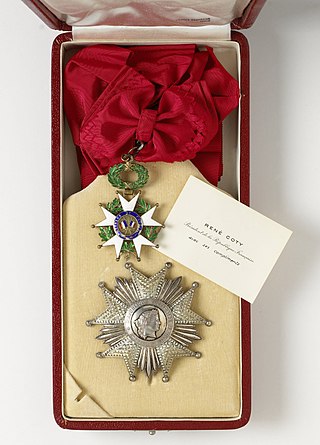
The National Order of the Legion of Honour, formerly the Imperial Order of the Legion of Honour, is the highest French order of merit, both military and civil, and currently comprises five classes. Established in 1802 by Napoleon Bonaparte, it has been retained by all later French governments and regimes.
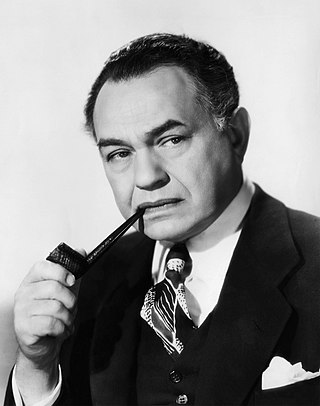
Edward G. Robinson was an American actor of stage and screen, who was popular during Hollywood's Golden Age. He appeared in 30 Broadway plays, and more than 100 films, during a 50-year career, and is best remembered for his tough-guy roles as gangsters in such films as Little Caesar and Key Largo. During his career, Robinson received the Cannes Film Festival Award for Best Actor for his performance in House of Strangers.
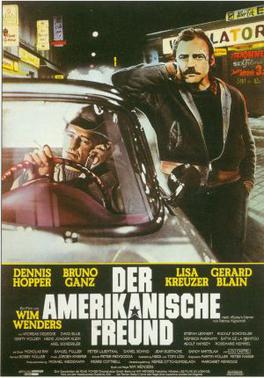
The American Friend is a 1977 neo-noir film written and directed by Wim Wenders, adapted from the 1974 novel Ripley's Game by Patricia Highsmith. It stars Dennis Hopper as career-criminal Tom Ripley and Bruno Ganz as Jonathan Zimmermann, a terminally ill picture framer whom Ripley coaxes into becoming an assassin. The film uses an unusual "natural" language concept: Zimmermann speaks German with his family and his doctor, but English with Ripley and while visiting Paris.

Rillettes is a preservation method similar to confit where meat is seasoned then submerged in fat and cooked slowly over the course of several hours. The meat is shredded and packed into sterile containers covered in fat. Rillettes is traditionally made with goose or duck, and are commercially most commonly made with pork, but also made with other meats such as chicken, game birds, rabbit and sometimes with fish such as anchovies, tuna, pike or salmon. Rillettes are typically served at room temperature spread thickly on toasted bread.

For centuries, Spain recruited foreign soldiers to its army, forming the foreign regiments such as the Regiment of Hibernia. However, the specific unit of the Spanish Army and Spain's Rapid Reaction Force, now known as the Spanish Legion, and informally known as the Tercio or the Tercios, is a 20th-century creation. It was raised in the 1920s to serve as part of Spain's Army of Africa. The unit, which was established in January 1920 as the Spanish equivalent of the French Foreign Legion, was initially known as the Tercio de Extranjeros, the name under which it began fighting in the Rif War of 1921–1926.
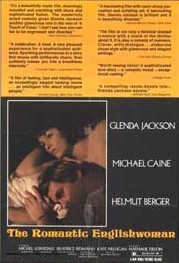
The Romantic Englishwoman is a 1975 British film directed by Joseph Losey and starring Michael Caine, Glenda Jackson, and Helmut Berger. It marks the feature-length screen debut for Kate Nelligan. The screenplay was written by Tom Stoppard and Thomas Wiseman, based on the novel by the same title by Thomas Wiseman.

Rififi is a 1955 French crime film adaptation of Auguste Le Breton's novel of the same name. Directed by American blacklisted filmmaker Jules Dassin, the film stars Jean Servais as the aging gangster Tony "le Stéphanois", Carl Möhner as Jo "le Suédois", Robert Manuel as Mario Farrati, and Jules Dassin as César "le Milanais". The foursome band together to commit an almost impossible theft, the burglary of an exclusive jewelry shop in the Rue de la Paix. The centerpiece of the film is an intricate half-hour heist scene depicting the crime in detail, shot in near silence, without dialogue or music. The fictional burglary has been mimicked by criminals in actual crimes around the world.
Pulp noir is a subgenre influenced by various "noir" genres, as well as pulp fiction genres; particularly the hard-boiled genres which help give rise to film noir. Pulp noir is marked by its use of classic noir techniques, but with urban influences. Various media include film, illustrations, photographs and videogames.

Kevin Serge Durand is a Canadian actor. He is best known for portraying Vasiliy Fet in The Strain, Joshua in Dark Angel, Martin Keamy in Lost, Fred J. Dukes / The Blob in X-Men Origins: Wolverine, Barry Burton in Resident Evil: Retribution, Gabriel in Legion, Little John in Robin Hood, Jeeves Tremor in Smokin' Aces, Carlos in The Butterfly Effect, and Proximus Caesar in Kingdom of the Planet of the Apes. He received a 2012 Best Supporting Actor Genie nomination for his portrayal of Lenny Jackson in Citizen Gangster.
Mafia comedy films are a subgenre hybrid of comedy films and crime/gangster films.

China Gate is a 1957 American CinemaScope war film written, produced and directed by Samuel Fuller and released through 20th Century Fox. The film is set during the First Indochina War (1946–1954), and depicts the relationship between a sergeant of the French Foreign Legion and the Eurasian wife whom he had abandoned.

Now We're in the Air is a 1927 American silent comedy film directed by Frank R. Strayer, starring the late-1920s intermittent comedy team of Wallace Beery and Raymond Hatton. In a supporting role, Louise Brooks plays twins, one raised French and the other raised German.
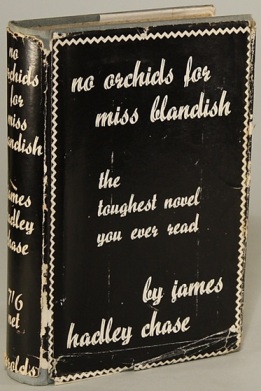
No Orchids for Miss Blandish is a 1939 crime novel by the British writer James Hadley Chase. It was a critical and commercial success upon release, though it also provoked considerable controversy due to its explicit depiction of sexuality and violence. In 1942, the novel was adapted into a stage play and in 1948 it became a British film. The novel became particularly popular with British servicemen during World War II.
Georges Arthur Surdez (1900–1949) was a writer of adventure stories. He invented the term "Russian Roulette" in a story of the same name published in Collier's magazine.
The Master Thriller Series was a series of British pulp magazines that reprinted American pulp fiction in various genres. It was published by The World's Work, starting in July 1933, and lasted till the end of 1939. Authors who appeared in its pages included Somerset Maugham and Algernon Blackwood.













